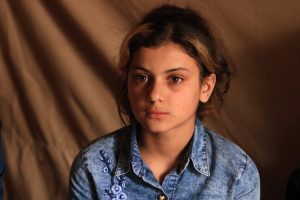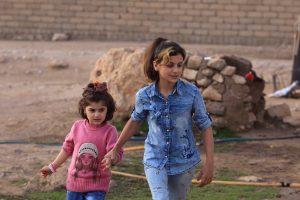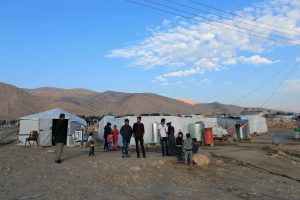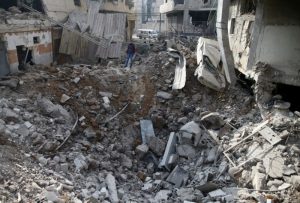
y Raya Jalabi
SHARYA, Iraq (Reuters) – When Rosa, now 14, asked her Islamic State captors about her younger sisters Bushra, 12, and Suhayla, seven, she was told they had been killed for misbehaving.
“At that point, I didn’t care about anything anymore. Even if I died,” she said. “I never thought I’d see them again.”
The sisters were finally reunited on Sunday, more than three years after being taken by the militants in an assault on Sinjar, the Yazidi heartland on August 3, 2014.

Yazidi girl Rosa, 13, who was reunited with her family after being enslaved by Islamic State militants, is seen at Sharya Camp in Duhuk, Iraq December 18, 2017. REUTERS/Ari Jalal
Just last week, Iraq declared “final victory” over Islamic State, with parades through the streets of Baghdad in celebration after three years of bloody war.
But the damage done by the militants is not easily remedied: they brutalized Iraqis, exposing fault lines in the country’s already fragile social fabric and ripping families apart.
For Rosa and her family, though overjoyed at reuniting, the last three years will not be easily erased.
The militants shot, beheaded, burned alive or kidnapped more than 9,000 members of the minority religion, in what the United Nations has called a genocidal campaign against them. According to community leaders, more than 3,000 Yazidis remain unaccounted for.
Among them, are Rosa’s parents, thought murdered by the militants who rolled their victims into mass graves scattered across the sides of Sinjar mountain, where thousands of Yazidis still live in tents.
The girls’ nine-year-old brother, Zinal, is also still missing. Captured and held with them in the nearby city of Tal Afar, he was later driven away to Mosul in a car full of young Yazidi boys. They haven’t heard from him since.
SEPARATED AND SOLD
Reuters could not verify all of the details given by Rosa, Bushra and some of the five older brothers they now live with in a group of tents in the tiny village of Sharya in Iraq’s Kurdistan region.
But Amin Khalat, spokesperson for Kurdish government office which helps return missing Yazidis, said Rosa and Suhayla had been taken to Syria and Turkey respectively after being held in Tal Afar and that his office had helped reunite them with their family.

Yazidi girls Suhayla, 7, and Rosa, 13, who were reunited with their family after being enslaved by Islamic State militants, walk at Sharya Camp in Duhuk, Iraq December 18, 2017. REUTERS/Ari Jalal
He said Rosa was returned from Syria by fighters from the Kurdistan Workers Party (PKK) and Suhayla by the Iraqi government which was alerted to her existence by Turkish officials who found her at a refugee camp in Turkey. Her family then recognized her photograph.
Rosa said she and her younger siblings were sold, by the Islamic State militants who attacked Sinjar, to a fighter and his family in Tal Afar, a city of predominantly ethnic Turkmen which produced some of the group’s most senior commanders.
She said she did all the household chores and cared for her siblings and other young Yazidi captives, who lived together in a tiny room.
After a year together, Zinal was taken to Mosul, while Suhayla and Bushra were sold off to separate Islamic State families, close to one another, but not allowed to meet. After Bushra’s captors took her to Rosa’s house for a visit, she said she memorized the route so she could return.
“I would wait till everyone fell asleep in the afternoon, I’d pretend to fall asleep and then sneak out to see Rosa,” said Bushra. “They once caught me and threatened to sell me off if I didn’t stop seeing my sister but I didn’t care.”
Bushra said she was eventually sold again, but about a year ago, she and six older Yazidi girls ran away and reached Sinjar, where Kurdish fighters helped them find their families.
Rosa was taken to Deir Ezzor, Syria and sold twice more. She said she was originally bought for $4 in Tal Afar and last sold in Syria for $60. “Those dogs made quite a good profit out of me,” she said with a wry smile. PKK fighters came across her in Idlib and brought her back to Iraq and her family, she said.
Suhayla was taken by her Turkmen captors to a refugee camp in Turkey, where authorities discovered her situation and repatriated her. She was reunited with her sisters and other relatives on Sunday, a day after Rosa returned.

A general view of Sharya Camp, where Yazidi girls (back) who were reunited with their family after being enslaved by Islamic State militants reside in Duhuk, Iraq December 18, 2017. REUTERS/Ari Jalal
Beaten, forced to convert and forget their native Kurdish, the girls even had their names changed.
Rosa was known as Noor – hers was an infidel’s name, her captors told her. Suhayla, captured when she was three, barely recognizes her sisters and speaks in broken Turkman dialect and Arabic.
“She has to learn to remember us again,” said Rosa. “She got used to calling some strangers mum and grandpa while she was held captive.”
Her sisters say Suhayla has barely spoken since returning to her family, but wearing a pink sweater and plastic jewelry, she relaxed under a flood of kisses from her sisters.
Bushra, nine when she was captured, is only at ease with her closest relatives. Because she returned to the family first, her brothers have asked her to help her sisters, but she warned them that it would not be easy.
“It’s true we are strong, we’ve been through so much. But our hearts are weak – they’re broken.”
(Reporting by Raya Jalabi; editing by Philippa Fletcher)













